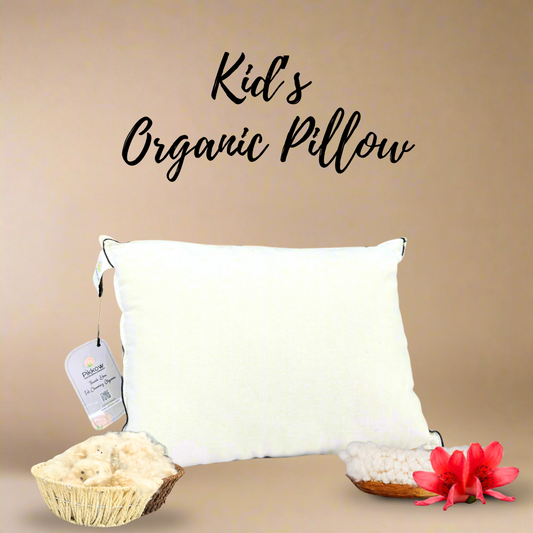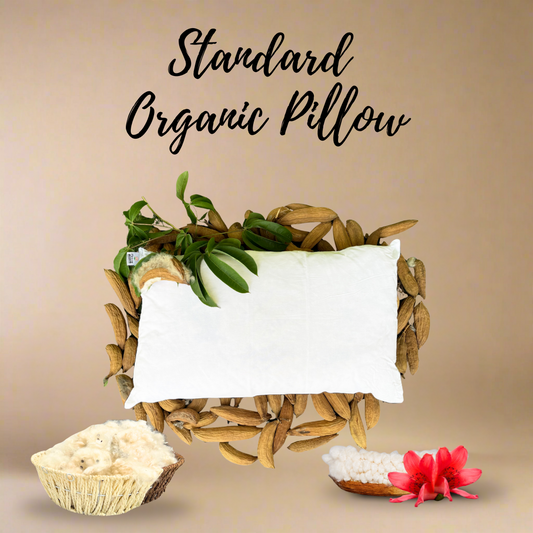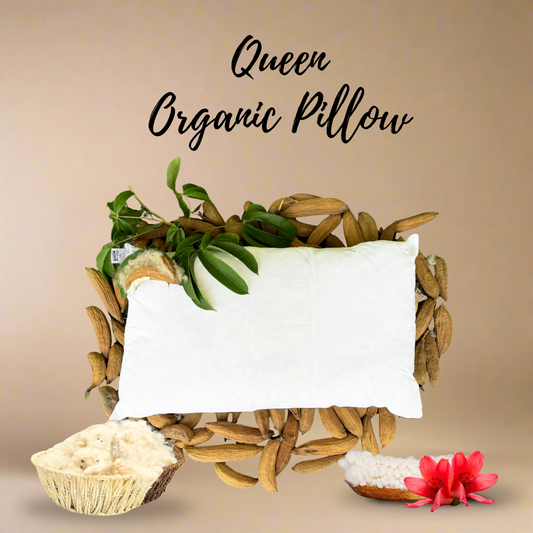When it comes to getting quality sleep, many of us focus on the mattress but often ignore the role of pillows. Surprisingly, the type of pillow you use can significantly affect your sleep quality, health, and even the environment. If you’re still using synthetic pillows made from polyester or other artificial fibers, it might be time to reconsider. The benefits of switching to natural pillows go beyond just comfort—they extend to your well-being and the planet.
In this blog, we’ll explore why making the change matters, what makes natural pillows superior, and how they support a healthier, more sustainable lifestyle.
1. Better Sleep Quality with Organic Comfort
One of the biggest benefits of switching to natural pillows is improved sleep quality. Organic pillows, made from materials like cotton, wool, or kapok, offer breathability that synthetic fibers simply cannot match. Natural fibers allow air circulation, preventing overheating during the night. This means you stay cool in summer and warm in winter, allowing for uninterrupted, restful sleep.
Unlike synthetic pillows that often trap heat and moisture, natural pillows provide a fresh and supportive surface for your head and neck, ensuring better sleep hygiene.
2. Non-Toxic and Safe for Your Health
Most synthetic pillows are treated with chemicals like flame retardants and dyes that can emit harmful gases over time. Choosing non-toxic pillows eliminates this risk. One of the underrated natural pillow health benefits is that they are free from harsh chemicals, making them a safer option for sensitive individuals, children, and allergy sufferers.
Breathing clean, chemical-free air while you sleep contributes to overall health and reduces the risk of respiratory issues. This small switch can make a big difference in your wellness journey.
3. Long-Lasting and Durable

The benefits of switching to natural pillows also include durability. While synthetic pillows tend to flatten and lose shape quickly, natural ones such as wool or kapok retain their loft for much longer. Kapok pillow advantages include their resilience and softness—kapok fibers are lightweight yet sturdy, allowing the pillow to maintain its structure for years without sagging.
This means fewer replacements, saving you money in the long run while reducing waste.
4. Eco-Friendly Bedding Choice
If sustainability matters to you, opting for eco-friendly bedding is a must. Natural pillows are biodegradable and come from renewable resources. Unlike synthetic pillows, which contribute to landfill waste and environmental pollution, natural ones align with sustainable sleep solutions that promote eco-conscious living.
Making this shift is not only a personal health upgrade but also a step toward an eco-conscious sleep lifestyle, where your choices help reduce your carbon footprint.
5. Naturally Hypoallergenic

Another reason to ditch synthetics is the allergy factor. Many synthetic pillows harbor dust mites and trap moisture, leading to bacteria and mold buildup. Natural pillows, however, resist dust mites and wick away moisture naturally.
This is one of the strongest natural pillow health benefits for allergy sufferers. Materials like latex and wool naturally repel allergens, keeping your sleep environment clean and healthy.
6. Superior Neck and Spine Support
Pillows aren’t just about comfort—they’re about posture. The benefits of switching to natural pillows extend to proper neck and spinal alignment. Natural materials like latex or kapok mold gently to your shape, giving you the right balance of softness and support.
This ergonomic support can help reduce morning stiffness, headaches, and neck pain, issues often linked to the use of synthetic pillows that collapse under weight.
7. Sustainable Lifestyle Choice
Finally, one of the most rewarding benefits of switching to natural pillows is knowing you are contributing to the planet’s well-being. Natural pillows are part of a larger movement toward sustainable sleep solutions and mindful consumption. When you choose biodegradable, responsibly sourced materials, you align with a lifestyle that values health, environment, and long-term balance.
It’s not just about better sleep—it’s about creating harmony between your well-being and the planet’s.
Natural vs Synthetic Pillows: A Quick Comparison
Still unsure? Here’s a snapshot of natural vs synthetic pillows:
-
Breathability: Natural pillows allow air circulation, while synthetics trap heat.
-
Durability: Natural materials like kapok and wool outlast polyester fibers.
-
Health: Non-toxic pillows are free from harmful chemicals; synthetic ones may contain allergens.
- Environment: Natural pillows are biodegradable, while synthetic ones add to landfill waste.
Still unsure? Here’s a detailed comparison of natural vs synthetic pillows to help you decide:
Feature |
Natural Pillows 🌿 |
Synthetic Pillows 💤 |
|
Material |
Organic cotton, wool, latex, kapok |
Polyester, memory foam, microfiber |
|
Breathability |
Excellent airflow, prevents overheating |
Traps heat and moisture |
|
Durability |
Long-lasting, holds shape for years |
Flattens quickly, needs frequent replacement |
|
Health Safety |
Non-toxic pillows, chemical-free |
May contain chemicals and flame retardants |
|
Allergy Resistance |
Naturally hypoallergenic, resists dust mites & mold |
Attracts dust mites, may trigger allergies |
|
Eco-Friendliness |
Biodegradable, part of eco-friendly bedding |
Adds to landfill waste, non-biodegradable |
|
Comfort & Support |
Balanced support, adapts to neck & spine ergonomics |
Often collapses under weight, poor support |
|
Cost-Effectiveness |
Higher initial cost but durable (sustainable sleep solutions) |
Cheaper upfront but replaced more often |
This table makes it clear why the benefits of switching to natural pillows outweigh synthetic ones in every aspect—comfort, health, and sustainability.
Final Thoughts
Switching to natural pillows is more than just a bedding upgrade—it’s a lifestyle choice that prioritizes your health and the planet. From better sleep quality to durability, from eco-friendly bedding to safer materials, the benefits of switching to natural pillows are undeniable.
Whether you choose wool, latex, or kapok, you’ll enjoy non-toxic pillows that promote eco-conscious sleep while offering long-lasting comfort. So, the next time you consider replacing your pillow, think beyond synthetics and embrace the natural pillow health benefits that truly redefine restful sleep.
FAQs About Natural Pillows
1. What are the main benefits of switching to natural pillows?
Natural pillows improve sleep quality, are chemical-free, durable, hypoallergenic, eco-friendly, and provide superior support for your neck and spine.
2. Are organic pillows better than synthetic ones?
Yes, organic pillows made from natural fibers offer better breathability, health benefits, and sustainability compared to synthetic options.
3. What are the kapok pillow advantages?
Kapok pillows are lightweight, supportive, durable, and naturally hypoallergenic. They combine softness with firmness, making them ideal for different sleep positions.
4. How do natural pillows support eco-friendly bedding and sustainability?
Natural pillows are biodegradable, sourced from renewable materials, and reduce waste, making them an essential part of sustainable sleep solutions and an eco-conscious sleep routine.
5. Are natural pillows really safer?
Absolutely. One of the most important natural pillow health benefits is that they are free from chemicals and toxins, unlike synthetic pillows which may release harmful substances over time.












